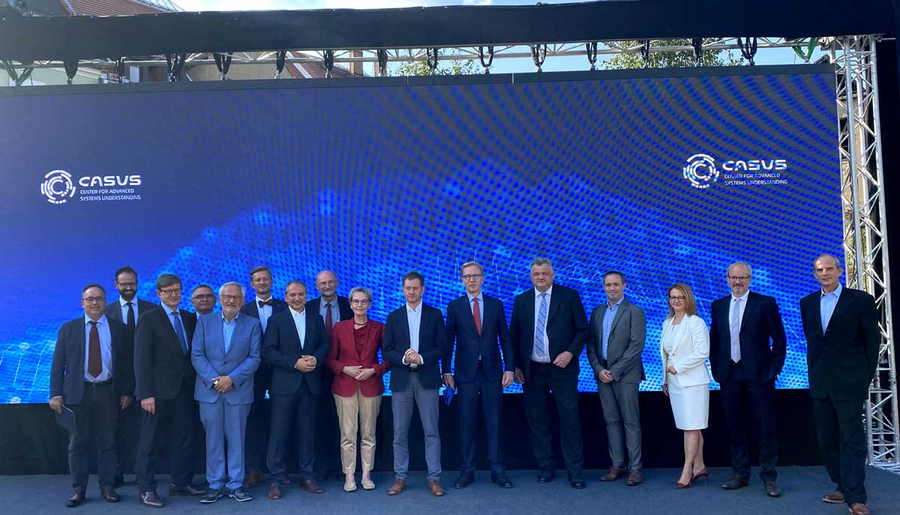
Group photo of the invited guests at CASUS Open House. © MPI-CBG
Saxony’s Minister President Michael Kretschmer and State Secretary Prof. Wolf-Dieter Lukas of the German Federal Ministry of Education and Research (BMBF) signed a declaration on the funding of the Center for Advanced Systems Understanding (CASUS) on September 4th, 2021 at the German-Polish research institute’s Open House event. According to the agreement, CASUS will be funded until 2038 with an annual budget of up to 15 million Euros. This long-term perspective will allow the “Old Capacitor Plant” on the Neisse River to be converted into a modern research facility. CASUS will be shaped as an institute of the Helmholtz-Zentrum Dresden-Rossendorf (HZDR) along with its partners, the Helmholtz Centre for Environmental Research in Leipzig (UFZ), the Max Planck Institute for Molecular Cell Biology and Genetics in Dresden (MPI-CBG), the Technische Universität Dresden (TUD), and the University of Wrocław. The cooperation agreements between the partners were also signed at the CASUS Open House event.
Saxony’s Minister President Michael Kretschmer emphasizes the momentum expected from this decision: “CASUS significantly strengthens the appeal of Görlitz as a research location. As can be seen here at the Open House Day, CASUS has attracted experts from all over the world to Görlitz, bringing crucial know-how to Lusatia. We need this expertise right here to be well-positioned for tomorrow’s topics such as artificial intelligence, supercomputing and open-source research software. Because of its long-term perspective, CASUS will grow even faster. We as the Free State of Saxony are supporting the development of a new research institute so that the scientists here in Görlitz can fully realize their potential.”
Saxony’s Minister of Science Sebastian Gemkow adds: “With CASUS, research in Saxony is entering new spheres. Here, excellent research and practice are close together, for I am convinced that the digital solutions developed at CASUS open up great potential for later product developments and thus a very concrete benefit for society.”
Dr. Michael Bussmann, Scientific Head of CASUS, attributes the research institute’s success to its interdisciplinary approach: “The digital solutions developed at CASUS are used in disciplines as diverse as climate and environmental research, systems biology, and astrophysics, where they help answer relevant scientific questions.”